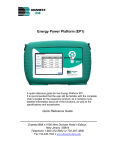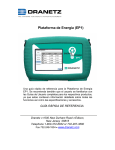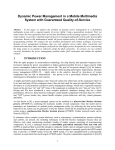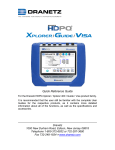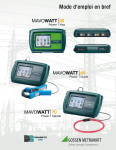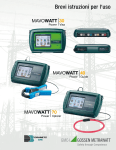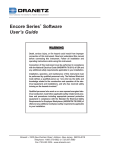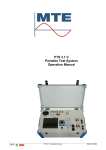Download Dranetz Visa Specifications
Transcript
Power Xplorer / Power Guide / Power Visa A quick reference guide for the PowerXplorer / PowerGuide/ PowerVisa product family. It is recommended that the user still be familiar with the complete User’s Guides for the respective products, as it contains more detailed information about all of the functions, as well as the specifications and accessories. Quick Reference Guide Dranetz • 1000 New Durham Road • Edison, New Jersey 08818 Telephone 1-800-372-6832 or 732-287-3680 Fax 732-248-1834 • www.dranetz.com WARNING Death, serious injury, or fire hazard could result from improper connection of this instrument. Read and understand this manual before connecting this instrument. Follow all installation and operating instructions while using this instrument. Connection of this instrument must be performed in compliance with the National Electrical Code (ANSI/NFPA 70-2008) of USA and any additional safety requirements applicable to your installation. Installation, operation, and maintenance of this instrument must be performed by qualified personnel only. The National Electrical Code defines a qualified person as “one who has the skills and knowledge related to the construction and operation of the electrical equipment and installations, and who has received safety training on the hazards involved.” Qualified personnel who work on or near exposed energized electrical conductors must follow applicable safety related work practices and procedures including appropriate personal protective equipment in compliance with the Standard for Electrical Safety Requirements for Employee Workplaces (ANSI/NFPA 70E-2004) of USA and any additional workplace safety requirements applicable to your installation. Published by Dranetz 1000 New Durham Road Edison, NJ 08818-4019 USA Telephone: 1-800-372-6832 or 732-287-3680 Fax: 732-248-1834 Web site: www.dranetz.com Copyright ©2008 Dranetz All rights reserved. No part of this book may be reproduced, stored in a retrieval system, or transcribed in any form or by any means—electronic, mechanical, photocopying, recording, or otherwise—without prior written permission from the publisher, Dranetz, Edison, NJ 08818-4019. Printed in the United States of America. P/N QR-PXF Rev C 06.06.12 1 ADVERTENCIA Una conexión incorrecta de este instrumento puede producir la muerte, lesiones graves y riesgo de incendio. Lea y entienda este manual antes de conectar. Observe todas las instrucciones de instalación y operación durante el uso de este instrumento. La conexión de este instrumento a un sistema eléctrico se debe realizar en conformidad con el Código Eléctrico Nacional (ANSI/NFPA 70-2008) de los E.E.U.U., además de cualquier otra norma de seguridad correspondiente a su establecimiento. La instalación, operación y mantenimiento de este instrumento debe ser realizada por personal calificado solamente. El Código Eléctrico Nacional define a una persona calificada como "una que esté familiarizada con la construcción y operación del equipo y con los riesgos involucrados." El personal cualificado que trabaja encendido o acerca a los conductores eléctricos energizados expuestos debe seguir prácticas y procedimientos relacionados seguridad aplicable del trabajo incluyendo el equipo protector personal apropiado en conformidad con el estándar para los requisitos de seguridad eléctricos para los lugares de trabajo del empleado (ANSI/NFPA 70E-2004) de los E.E.U.U. y cualquier requisito de seguridad adicional del lugar de trabajo aplicable a su instalación. 2 AVERTISSEMENT Si l'instrument est mal connecté, la mort, des blessures graves, ou un danger d'incendie peuvent s'en suivre. Lisez attentivement ce manuel avant de connecter l'instrument. Lorsque vous utilisez l'instrument, suivez toutes les instructions d'installation et de service. Cet instrument doit être connecté conformément au National Electrical Code (ANSI/NFPA 70-2008) des Etats-Unis et à toutes les exigences de sécurité applicables à votre installation. Cet instrument doit être installé, utilisé et entretenu uniquement par un personnel qualifié. Selon le National Electrical Code, une personne est qualifiée si "elle connaît bien la construction et l'utilisation de l'équipement, ainsi que les dangers que cela implique". Le personnel qualifié qui travaillent dessus ou s'approchent des conducteurs électriques activés exposés doit suivre des pratiques en matière et des procédures reliées par sûreté applicable de travail comprenant le matériel de protection personnel approprié conformément à la norme pour des conditions de sûreté électriques pour les lieux de travail des employés (ANSI/NFPA 70E-2004) des Etats-Unis et toutes les conditions de sûreté additionnelles de lieu de travail applicables à votre installation. 3 WARNUNG Der falsche Anschluß dieses Gerätes kann Tod, schwere Verletzungen oder Feuer verursachen. Bevor Sie dieses Instrument anschließen, müssen Sie die Anleitung lesen und verstanden haben. Bei der Verwendung dieses Instruments müssen alle Installation- und Betriebsanweisungen beachtet werden. Der Anschluß dieses Instruments muß in Übereinstimmung mit den nationalen Bestimmungen für Elektrizität (ANSI/NFPA 70-2008) der Vereinigten Staaten, sowie allen weiteren, in Ihrem Fall anwendbaren Sicherheitsbestimmungen, vorgenommen werden. Installation, Betrieb und Wartung dieses Instruments dürfen nur von Fachpersonal durchgeführt werden. In dem nationalen Bestimmungen für Elektrizität wird ein Fachmann als eine Person bezeichnet, welche "mit der Bauweise und dem Betrieb des Gerätes sowie den dazugehörigen Gefahren vertraut ist." Qualifiziertes Personal, das an bearbeiten oder herausgestellte angezogene elektrische Leiter sich nähern, muß anwendbare Sicherheit bezogener Arbeit Praxis und Verfahren einschließlich passende persönliche schützende Ausrüstung gemäß dem Standard für elektrische Sicherheitsauflagen für Angestellt-Arbeitsplätze (ANSI/NFPA 70E-2004) der Vereinigten Staaten und alle zusätzlichen Arbeitsplatzsicherheitsauflagen folgen, die auf Ihre Installation anwendbar sind. 4 Safety Summary Definitions WARNING statements inform the user that certain conditions or practices could result in loss of life or physical harm. CAUTION statements identify conditions or practices that could harm the instrument, its data, other equipment, or property. NOTE statements call attention to specific information. Symbols The following International Electrotechnical Commission (IEC) symbols are marked on the top and rear panel in the immediate vicinity of the referenced terminal or device: Caution, refer to accompanying documents (this manual). Alternating current (ac) operation of the terminal or device. Direct current (DC) operation of the terminal or device. Power switch . 5 Safety Precautions The following safety precautions must be followed whenever any type of voltage or current connection is being made to the instrument. • Connect the green safety (earth) ground first, before making any other connections. • When connecting to electric circuits or pulse initiating equipment, open their related breakers. DO NOT install any connection of the instrument on live power lines. • Connections must be made to the instrument first, then connect to the circuit to be monitored. • Wear proper personal protective equipment, including safety glasses and insulated gloves when making connections to power circuits. • Hands, shoes and floor must be dry when making any connection to a power line. • Make sure the unit is turned OFF before connecting probes to the rear panel. • Before each use, inspect all cables for breaks or cracks in the insulation. Replace immediately if defective. • If the equipment is used in a manner not specified in this user’s guide, the protection provided by the equipment may be impaired. These safety precautions are repeated where appropriate throughout this manual. 6 TABLE OF CONTENTS Introduction …………………………………….…… 8 Connect to AC Power Source ………………………… 9 Making Connections…………….……………………… Connecting Voltage Measurement Cables………….. 3 Phase Four Wire Wye……………………………….. 3 Phase (Floating or Grounded) Delta ………………. 11 14 16 17 User Interface……………………………..……………. 19 Other Instrument Setup.....................……………….. 21 Real Time Meter Modes………………………………... Scope Mode ……………………………………………… Meter Mode ………………………………………………. Harmonics ………………………………………………… Phasor Diagram …………………………………………. 21 21 21 22 22 Stored Data Functions and Displays ………………. Trend …………….. ……………………………………. Events….. ……………………………………………… 23 23 23 Reports ………………………..………………………… EN50160 …………………………………………. Annunciator ………………………………………… 26 26 27 Setups ………………………………………………. Measurement Connections ………………………… Automatic Setup ……………………………………… Monitoring Menu ……………………………………… Wizard Setup ………………………………………….. 27 28 28 29 30 Example of Power Quality setup using the Wizard.. 37 Example of Energy / Demand setup using the Wizard 38 General Specifications ……………………………….. 39 Statement and Notices ………………………………… 40 7 Introduction The Dranetz PowerXplorer® PX5, Power Guide 4400, and the Power Visa are three portable, hand-held, eight-channel power quality meter/monitors, very similar in operation though the PX5 and 4400 have some additional parameters not in the Power Visa, and the PX5 has a high speed sampling board for capturing the details of very fast transients. The common features are covered in this document, and the PX5 name will be used to represent all three instruments. These cuttingedge power quality instruments are designed with a color liquid crystal display (LCD) 1/4 VGA, using touch screen technology. They can monitor, record and display data on four voltage channels and four current channels simultaneously. PX5 is designed to meet both the IEEE 1159 and IEC 61000-4-30 Class A standards for accuracy and measurement requirements. It can do PQoptimized acquisition of power quality related disturbances and events. It is designed with a statistical package called Quality of Supply (QOS), with monitoring and setup protocols set to determine voltage measurement compliance required for EN50160 monitoring. European standard EN50160 requires that measurement parameters must be within a specified percentage for 95% of the time. The PX5 firmware can monitor power quality phenomena for troubleshooting and/or compliance purposes. It can record inrush conditions, carry out long-term statistical studies to establish performance baselines, and perform field-based equipment testing and evaluation for commissioning and maintenance. The firmware integrates an intuitive instrument setup procedure to ensure the capture of all relevant data for additional post process analysis, report writing, and data archiving using other compatible Dranetz software applications such as NodeLink® and DranView®. Getting Started • Battery Charge Before proceeding the unit needs to be charged for a minimum 6 hours prior to be placed in service. 8 Connecting to AC Power Source Power The PX5 AC adapter can be connected to a 90-265V specifications ac power input source. CAUTION Always set the power switch to the off position before connecting or disconnecting the input power cable. Operation of the PX5 from an ac voltage source other than the rated voltage input stated on the unit nameplate can cause damage to the unit. PRECAUCION Siempre fije el interruptor de encendido en la posición apagada antes de conectar o desconectar el cable de energía de entrada. La operación del PX5 desde una fuente de voltaje de ca que no sea la entrada de voltaje nominal indicada en la placa de identificación de la unidad puede causar daños a la unidad. MISE EN GARDE Mettez toujours l’interrupteur dans la position ouverte avant de connecter ou de déconnecter le câble d’alimentation primaire. Mettez toujours l’interrupteur dans la position ouverte avant de connecter ou de déconnecter le câble d’alimentation primaire. VORSICHT Vor dem Einstecken bzw. Ausstecken des Eingangsnetzkabels den Netzschalter immer in die Aus-Stellung bringen. Der Betrieb des PX5 von einer Wechselspannungsquelle, die nicht dem auf der Namensplatte der Einheit aufgeführten Nennspannungseingang entspricht, kann zur Beschädigung der Einheit führen. 9 AC power Source PX5 can be operated from a 50/60 Hz, 120/230V AC power source with or without the battery pack installed. • Voltage range, 120/230V ac. • Frequency, 50/60Hz. • Power Consumption, 20W. STEP 1 Connect ac adapter/battery charger plug into right side of PX5. STEP 2 Plug the ac adapter into an ac power source. STEP 3 Press the PX5 On/Off power button to turn the unit on. Result: The Home screen will be displayed. 10 11 1. Voltage and Current Connections – there are four differential voltage and four differential current channels, which can be wired to measure a variety of circuit configurations. Use only Dranetz voltage leads and current probes for proper operation. Do not exceed marked ratings. 2. Graphic Color LCD with Touch Screen – the color LCD has an integral touch screen that is used to select functions for setups, real time meters, and viewing stored data. Either a clean finger or a PDA-type stylus can be used and the screen should be calibrated with whichever you are going to use by selecting Preferences; Display Preferences, then Calibrate Touch screen when first turned on. Clean only with soft cloth. 3. Field Replaceable Battery Pack – the internal UPS feature requires that the internal batteries be properly charged and maintained. If the battery pack is in need of replacement, deenergize the connections and power to the unit before opening the battery door and replacing the pack only with the Dranetz battery pack PN# BP-PX5. A spare battery pack may be useful to have. 4. Memory Card slots for data and firmware updates – the Dranetz supplied Compact Flash memory cards are used for data storage, as well as to upload new firmware versions when available. Use only Dranetz supplied memory cards, as the speed requirements of the instrument can not be satisfied by many off-the-shelf memory cards. Do not remove the memory card while monitoring. Only one slot is active at a time. 5. There are three status LEDs and the ON/OFF switch (push for on, push for off) are located on the bottom of the instrument. AC power connection for charging the battery and powering the unit with AC Adapter 117029-G1 is located on the right side of the instrument. From left to right, the LEDs are: • 3 Battery Charge Indicator. LED will light steadily while battery is fast charging and blink when fully charged. • 4 Status Indicator. LED will light steadily when abnormal condition is detected. The unit is operating normally when light is off. • 5 Power Indicator. LED will blink in a heartbeat fashion (once per second) when the unit is operating normally. 12 MAKING CONNECTIONS WARNING Death, serious injury, or fire hazard could result from improper connection of this instrument. Read and understand the warnings in the beginning of this manual before connecting this instrument. ADVERTENCIA Una conexión incorrecta de este instrumento puede producir la muerte, lesiones graves y riesgo de incendio. Lea y entienda este manual antes de conectar. Observe todas las instrucciones de instalación y operación durante el uso de este instrumento. AVERTISSEMENT Si l'instrument est mal connecté, la mort, des blessures graves, ou un danger d'incendie peuvent s'en suivre. Lisez attentivement ce manuel avant de connecter l'instrument. Lorsque vous utilisez l'instrument, suivez toutes les instructions d'installation et de service. WARNUNG Der falsche Anschluß dieses Gerätes kann Tod, schwere Verletzungen oder Feuer verursachen. Bevor Sie dieses Instrument anschließen, müssen Sie die Anleitung lesen und verstanden haben. Bei der Verwendung dieses Instruments müssen alle Installation- und Betriebsanweisungen beachtet werden. 13 Connecting Voltage Measurement Cables Measurement cable set Description: Voltage measurement cables are provided as standard accessories and are stored in a cable pouch as part of the measurement cable set, P/N 116042-G3. Each cable set consists of a cable and alligator clip. Voltage Rating: Direct connection of all voltage measurement cables are rated at 600 Vrms max. For measuring voltages greater than 600 Vrms, potential transformers (PTs) must be used. Optional fused voltage adapter There are two optional fuse accessory kits available for use with the measurement cables for PX5. One kit (P/N FVA-1) contains one fused voltage adapter and one measurement connecting Red cable 50 cm in length. The other kit (P/N FVA-4) contains four voltage adapters and four measurement connecting cables 50 cm in length (one Red, one Yellow, one Blue, and one Grey). • • • • WARNING: To avoid the risk of electric shock or burns, always connect the safety (or earth) ground before making any other connections. WARNING: To reduce the risk of fire, electrical shock, or physical injury it is strongly recommended to fuse the voltage measurement inputs. Fuses must be located as close to the load as possible to maximize protection. WARNING: For continued protection against risk of fire or shock hazard replace only with same type and rating of recommended fuse. Use only fast blow type fuse which is rated 600V. Recommended fuse type is Littelfuse, part number KLKD0.30 rated 600V AC/DC, 0.3A fast blow. WARNING: Do not replace fuse again if failure is repeated. Repeated failure indicates a defective condition that will not clear with replacement of the fuse. Refer condition to a qualified technician. 14 --------------------------------------------------------------------------------PX5 can monitor the following power configurations: • Single phase • Split phase • 3 Phase Delta • 3 Phase Wye • 3 Phase 2-Wattmeter Delta • Generic • 2 ½ Element without Vb • 2 ½ Element without Vc 3 Phase Wye and 3 Phase Delta are described in this Quick Reference version of the User’s Guide. For other configurations, please consult the complete Users’ Guide, UG-PX5. 15 3 Phase, Four Wire Wye Channels A, B, and C are connected to voltage and current probes. The neutral is connected to common and is the reference for the three channels. The figure also shows voltage connection using channel D as a differential input for measuring neutral to ground voltage. Neutral to ground measurements are important but optional. 16 3 Phase (Floating or Grounded) Delta In this power connection, the PX5 uses voltage channels A, B, and C as differential inputs with channel A using source voltage A-B, channel B using B-C, and channel C using C-A as the reference. Current probes are connected to channels A, B, and C. Neutral to ground measurements are important but optional. 17 Split Phase and Open Delta For either of these two power connections, the PX5 uses only two voltage channels A and B as differential inputs with channel A using source voltage A-N or A-C and, channel B using B-N or B-C. Current probes are connected to channels A and B. Neutral to ground measurements are important for split phase but optional. Split Phase (above) Open Delta (below) 18 USER INTERFACE The instrument powers up with the Home Page screen, shown above. The top portion of the screen is for status information, including: monitoring status (on, off, or armed); what type of circuit is being monitored; the memory card status (not inserted or percentage full); the data file name; the number of waveform cycles saved (indication of event activity); number of journal records saved (periodic timed storage of parameters); and, the real time clock display. The first row of icons are referred to as Real-Time-Meters, showing the instantaneous values of the parameters. The second row of icons are for display of stored data, either through trend plots, event waveforms and rms plots, and reports of either EN50160 data or an annunciator panel of user selectable parameters and their state (normal, out of limits). Also in this second row is the icon for setting up instrument parameters, such as time/date, memory, language, LCD, and touch screen. 19 In the bottom of the screen is a button for Start menu, which allows for starting to monitor from either the existing setup, recalling a stored setup from the memory card, or going through the setup process again, either in automatic setup mode, or the step-by-step wizard. OTHER INSTRUMENT SETUP Functions, such as the time/date, which language, communication port setups, and LCD settings can be changed from the Instrument Settings menu, as well are formatting a memory card. This screen is activated from the PREFERENCES icon on the Home page. 20 REAL TIME METER MODES Scope mode Scope mode functions as an oscilloscope, displaying real-time waveforms of voltage and current for up to eight channels simultaneously, with one second update rate. The colors of waveform display are user programmable. Scope mode also provides a textual display of rms values, division for axis values, and frequency. Meter mode Meter mode functions as a true rms voltmeter and a true rms clamp-on ammeter. Voltage and current measurements, along with other calculated and advanced power parameters, are displayed on the Meter mode screens in both textual and graphical format. 21 Harmonics Harmonics display the amplitude and phase of each harmonic to the 63rd harmonic in both graphical and textual format. User can select which parameter to show the harmonics for (V,I,W), which channel (A,B,C,D), zoom in a the 5Hz components, set options such as showing harmonics and/or interharmonics and displaying in Hz or harmonic number, scaling to the fundamental or absolute value, and a list of the harmonic magnitudes and phase angles in tabular fashion. Phasor diagram The phasor screen displays a graph that indicates phase relations between voltage and current based upon the angles at the fundamental frequency, as determined by Fourier analysis. Phasor diagram displays voltage and current phasors for all channels. Functioning as a phase angle meter, the unit can display system imbalance conditions and provides such information in textual form also. The phase angle display can also verify if monitoring connections have been made correctly. Animated phasor demo rotations demonstrating resistive, inductive and capacitive loads can be displayed. 22 STORED DATA FUNCTIONS and DISPLAYS Trend Users can generate plots for all journalled data combined with min/max recordings of that parameter. Most journal parameters have multiple channels to plot. Events An event occurs when a programmed threshold limit is crossed. An event consists of the pre-trigger cycle(s), trigger cycle(s), and post-trigger cycles(s) The event data for all of the captured channels can be displayed in time plots of the rms values or waveforms, event details such as trigger conditions, characterization of the event according to PQ standards, and min/max values, or the time-stamped event list. Trend of rms voltage and current 23 Waveforms from transient event capture Detailed information of transient event capture 24 List of events with characteristics 25 REPORTS There are two types of reports – EN50160 for Quality of Supply reporting, and the Annunciator panel, which the user can select to display the present state of 4-16 parameters EN50160 If a parameter is below the 95% limit for EN50160, then the bar graph will turn red. Some of the parameters have more detailed information about them, which can be displayed by pressing on the parameter name. History of prior measurement weeks can be displayed, along with the magnitude and duration distribution table (DISDIP), and the min/max values during monitoring interval. 26 ANNUNCIATOR If the parameter is outside of the normal), it will either turn yellow limits (low or high) or flashing red (very high or very low) until the user clears the annunciator to reset them all to green. Pressing the parameter button itself will show time plots and other detailed information about the parameter. --------------------------------------------------------------------------------SETUPS Setup is a configuration of parameter thresholds that control the data recorded by PX5. Users may perform instrument setup in three ways: via Automatic Setup which utilizes auto-configured settings and allows users to proceed directly with data monitoring; via Wizard Setup which follows a step-by-step sequence where users go through a series of circuit setup screens; or via Advanced Options setup which allows users to modify trigger parameters and intervals or tweak threshold settings. 27 MEASUREMENT CONNECTIONS PX5 can monitor the following power configurations: • Single phase • Split phase • 3 Phase Delta • 3 Phase Wye • 3 Phase 2-Wattmeter Delta • Generic • 2 ½ Element without Vb • 2 ½ Element without Vc While monitoring any of the above configurations, the PX5 can also be connected to monitor neutral to ground voltage and neutral or ground current. AUTOMATIC SETUP Automatic Setup is a one-stop process using pre-defined values to set the unit automatically. Users have the option to view the summary list of parameter settings, change probe types if current will be monitored, and/or proceed directly with data monitoring. 28 MONITORING MENU Once the setup (either stored, automatic or wizard) has been completed, the user can start monitoring instantly or monitor for a fixed period of time. 29 WIZARD SETUP Wizard Setup guides the user through the circuit setup step-by-step, via a series of screens prompting for information about the circuit to be monitored. The unit automatically turns on the correct channels, sets the parameter thresholds and waveform capture settings depending on the detected circuit type, nominal voltage and current values, and monitoring mode specified by the user. The screens are shown in the sequence that they appear when in the Wizard Setup. INPUT CONFIGURATION Current probe types (if used), scale factors (when using additional PTs and/or CTs), circuit configuration (single phase, wye, delta, etc), and the nominal voltage, current and frequency tracking range are set up first before selecting the monitoring mode. 30 Includes automatic detection and comparison of wiring versus selected configuration 31 MONITORING MODES Monitoring modes PX5 allows users to monitor events in the following setup categories: Standard Power Quality, Current Inrush, Fault Recorder, Long-term Timed Recording, Continuous Data Logging, and EN50160 Power Quality mode. Selecting any setup category automatically sets trigger and capture conditions. Advanced users re free to mix and match settings (see Chapter 6 Advanced Setup Options). Standard Power Quality, Demand, Energy: PX5 algorithms automatically evaluate existing rms and waveform conditions to optimize setups to reliably capture data. This feature ensures that the first-time user gets the expected results, while providing the experienced user with the ability to tweak settings for specific applications. Either way, the necessary data used to identify critical events and optimize mitigation solutions is recorded into the data card as it occurs. Current Inrush: Determining system characteristics during current inrush conditions such as impedance changes during motor energization or the I2t curve of a breaker trip is key to preventative maintenance and enhanced power system performance. Inrush type events such as motor start-up typically requires extended duration cycle-by-cycle recording. With PX5, users can capture and store detailed data to evaluate system performance against specifications and previous benchmark data. Under the current inrush mode, triggers are current-based. By operating in the inrush mode, the instrument will capture and store highly detailed data to 32 a Compact Flash data card in real time, then rearm and be ready to capture data during the next test run. Fault Recorder: A fault in a wire circuit is usually due to unintentional grounding, a break in the line, a crossing or shorting of the wires, etc. A digital fault recorder logs extended duration cycle-by-cycle recording. Under the fault recorder mode, triggers are voltage-based. PX5 can help locate failures detected in various components of assorted equipment by recording an extended period of cycle-by-cycle data to capture the entire duration of the fault and the associated system response. Long-term Timed Recording, Demand, Energy: Performing a statistically valid power quality energy survey requires the capture of a set of basic data over an extended period of time. PX5 is designed to facilitate longterm monitoring by collecting min/max/avg data at each predetermined interval in order to perform post-process harmonic and other events analysis. PX5 is also designed to be left unattended in the field, recording statistically representative data for long-term analysis. Using the Dranetz lockable portable case option or other available enclosures, power quality studies can be carried out in harsh weather environments. Continuous Data Logging, Demand, Energy: This logs the rms and power values once per second for totally gapless logging. Cyclic triggers are disabled. No waveforms are recorded under this monitoring mode. EN50160 Power Quality: EN50160 monitors and reports Quality of Supply (QOS) compliance as specified by the EN standard. The seven parameters required by EN50160 to determine QOS compliance are: Power Frequency, Supply Voltage Variations, Rapid Voltage Changes, Supply Voltage Unbalance, Harmonic Voltage, Interharmonic Voltage, and Mains Signalling. Motor Quality: Automatically sets up the parameters that affect the operation of motors. Motor parameters include True Power Factor, Horsepower, and Derating Factor, among others. 33 EVENT CAPTURE and JOURNAL SETTINGS The transient limits for instantaneous peak, high frequency transient (PX5 only), waveshape deviation and waveshape rms deviation; rms variation limits for cycle-to-cycle triggers (high, low, very low), waveform capture cross-trigger matrix, characterization options, journal limits (very high, high, low, very low), and journal interval rate can be changed by the user and saved as a template for future use. The wizard uses interactive graphical images to show the user what the present values are and the effect of the proposed changes, as illustrated below. 34 35 The cross trigger matrix determines which channels are saved when a given channel determines that an event has occurred. SITE NAME and MEMORY CARD SETUP The last step in the setup is to select the name for the data file, as well as perform any housekeeping functions on the memory card, such as format a new card or delete old data by reformatting. When multiple monitoring sessions are performed using the same file name, the instrument automatically increments and appends a number to the end of the file name. 36 Example of Power Quality setup using the Wizard Current Probe Select the current probes you are going to use from the list. If you are using LEMFlex make sure the probe and list match exactly. Full scale current should not exceed probe rating and nominal current should not be less than 10% of full scale. Scale Factors Set Scale factors if working with the secondary of PTs or CTs. If your Probe is in the list and selected, Amps Scale Factor should be 1 if not connected to a secondary of another CT. Circuit Type Select the circuit type. If you see a mismatch while connected you may not be connected properly or your current probes are reading <10% of full scale or could be V or I imbalance. You can choose to override and monitor anyway although not recommended if connection is wrong. Nominal Values If connected the unit will show values it is reading. If you are not connected, then you can set your values by pressing the blue bordered box. Mode of Operation Select Continue Monitoring Mode Select Standard Power Quality Advanced Options Six Sub-categories 1) Transient – Leave defaults as long as Nominal Values were correct. 2) RMS Variation – Leave defaults as long as Nominal Values were correct. 3) Waveform Capture – Easiest thing to do is set all boxes with a check mark. 4) Characterizer Options – Verify IEEE 1159. 5) Journal Limit – Select Disable, then disable All Note that this will disable alarming functions on the annunicator panel status report. Activate only those that you specifically need. 6) Journal Interval – Leave defaults. 37 Memory Card Name your survey. The Site Name will be your data file name. Format your memory card as long as other data files are saved on your PC. Finish then Start Now. Example of Energy/Demand setup using the Wizard Same as previous, except: Monitoring Mode Select Long Term Timed Advanced Options Select Journal Limits, then Disable ALL. Note that this will disable alarming functions on the annunicator panel status report. Activate only those that you specifically need. 38 General Specifications Dimensions Size: 12” Width x 2.5” Height x 8” Depth (30 x 6.4 x 20.3 cm) Weight: 4.2 pounds (1.9 kg) Environmental Operating: 0 to 50 °C (32 to 122 °F) Storage: -20 to 55 °C (4 to 131 °F) Humidity: 95% non-condensing Altitude: 2000m (6560 ft) maximum Installation categories Mains supply: Installation Category II, Pollution Degree 2 Measurement inputs: Installation Category III, Pollution Degree 2 39 Statements and Notices Statement of warranty All products of Dranetz are warranted to the original purchaser against defective material and workmanship for a period of one year from the date of delivery. Dranetz will repair or replace, at its option, all defective equipment that is returned, freight prepaid, during the warranty period. There will be no charge for repair provided there is no evidence that the equipment has been mishandled or abused. This warranty shall not apply to any defects resulting from improper or inadequate maintenance, buyer-supplied hardware/software interfacing, unauthorized modification or misuse of the equipment, operation outside of environmental specifications, or improper site preparation or maintenance. Statement of reliability The information in this manual has been reviewed and is believed to be entirely reliable, however, no responsibility is assumed for any inaccuracies. All material is for informational purposes only and is subject to change without prior notice. Notice regarding FCC compliance This device has been tested and found to comply with the limits for a Class A digital device, pursuant to Part 15 of the FCC Rules. These limits are designed to provide reasonable protection against harmful interference when the equipment is operated in a commercial environment. This equipment generates, uses, and can radiate radio frequency energy and, if not installed and used in accordance with the instruction manual, may cause harmful interference to radio communications. Operation of this equipment in a residential area is likely to cause harmful interference in which case the user will be required to correct the interference at his/her own expense. 40 Notice regarding proprietary rights This publication contains information proprietary to Dranetz. By accepting and using this manual, you agree that the information contained herein will be used solely for the purpose of operating equipment of Dranetz. Copyright This publication is protected under the Copyright laws of the United States, Title 17 et seq. No part of this publication may be reproduced, transmitted, transcribed, stored in a retrieval system, or translated into any language or computer language, in any form, by any means, electronic, mechanical, magnetic, optical, chemical, manual, or otherwise, without the prior written consent of Dranetz, 1000 New Durham Road, Edison, New Jersey 08818. Copyright © 2007 Dranetz All Rights Reserved. Printed in the United States of America. Trademarks PowerXplorer®, Scope Mode®, Nodelink® and Dranview® are registered trademarks of Dranetz. 41 42 43












































